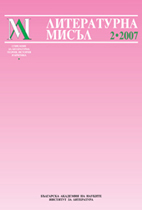Писателят като герой
The Writer as Hero
Author(s): Grigor GrigorovSubject(s): Literary Texts
Published by: Институт за литература - БАН
Keywords: literature; writer; hero
Summary/Abstract: The figure of the writer-hero is established only in the conditions of some premodern notion of literature, while the modern idea of literature produces the image of the professional writer, master of playing with words and creating plots. The writer-heroes execute the cultural function of “memory guards and glory sovereigns” (Veselovsky) and substitute the traditional ethical regulations with the decrees of a heroic code – they dethrone the everyday virtues and legalize the heroic virtues. According to multiple criteria (the heroic deed type, the existential position toward life and death, the specific authority of the speech, the type of heroic declarations, etc.) three social roles could be distinguished: the poet-revolutionary, the chronicler and the national poet. The role of the poet-revolutionary is constituted through the public poetic vow of heroism, declared in first person singular (Botev, Stambolov). In order to receive such a role from the public the writer-hero must accomplish the poetic vow during his life. In such cases, the execution of the heroic deed is realized as a unity of words and action – it is symptomatic that the most popular songs contain heroic declarations in first person. There is no other more adequate way to proclaim the heroic deed than the expression of the program followed by the heroic deed. If the figure of the poet-revolutionary is founded as “sovereign of glory”, the images of the chronicler and the national poet could be defined as “guards of memory”. The main feature that differentiates them is partiality–impartiality of shared knowledge. Representatives of the chronicler role are Zahary Stoyanov and Stoyan Zaimov, and their specific point of view consists of the unique knowledge of the witness and the impossibility to be an objective narrator. The speech of the chronicler gains its specific authority from the fact that the narrated events are not only knowledge, but also personal acquired experience. The position of risking their lives gives them the right to judge social vices – a right entirely used by Zahary Stoyanov. The role of the national poet, embodied by Ivan Vazov, is supplied with the authority of the commentator, nonparticipant in the narrated events, that is to say not trying to draw personal dividends from the constructed image of the past. The lack of social prestige of the participant is a weakness, compensated by the non-contradictory position of the distant commentator. The heroic sacrifice of the national poet is composed of full devotion to the creative power in the name of the national cause. The national poet builds the ideal image of the collective existence and his heroic sacrifice is expressed as a long-term civil duty. These three heroic writer roles are constituted in accordance with their different positions in relation to the border between life and death.
Journal: Литературна мисъл
- Issue Year: 2007
- Issue No: 2
- Page Range: 5-18
- Page Count: 14
- Language: Bulgarian
- Content File-PDF

